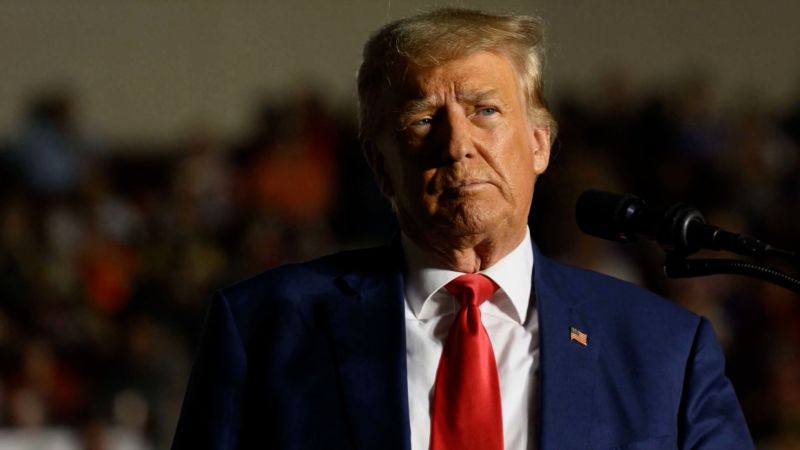The Impact of Believing in the Legitimacy of the 2020 Election on the 2024 GOP Nomination
The 2024 presidential election is looming, but the shadow of the 2020 election still looms large. Former President Donald Trump has been indicted and arraigned for his efforts to overturn the outcome of the 2020 election. Meanwhile, primary polls indicate that Trump and President Joe Biden are the frontrunners for their respective parties in the upcoming general election.
The Surprising Predictor of the Republican Nomination
Interestingly, the most significant predictor of vote choice for the Republican nomination is whether voters view the 2020 election as legitimate. Trump’s ability to convince a large portion of the Republican base that Biden’s win was illegitimate is paying off as he seeks the GOP nomination for a third time.
The Widespread Belief in Election Fraud
Poll after poll has shown that approximately two-thirds of Republican voters believe the falsehood that Biden’s win was not legitimate. In a recent CNN/SSRS poll, 71% of registered Republican and Republican-leaning independent voters viewed Biden’s win as illegitimate, compared to only 27% who believed it was legitimate. This belief has remained consistent in previous polls as well.
The Impact on Trump’s Support
The belief in the illegitimacy of Biden’s win has a significant impact on Trump’s support among Republican voters. In the same May poll, Trump garnered 64% of the vote among those who believed the 2020 election was illegitimate. However, his support dropped to a mere 27% among those who viewed Biden’s win as legitimate. This 37-point difference in support based on the legitimacy question is substantial.
The Dividing Line in the GOP Primary
The belief in the legitimacy of the 2020 election is a significant dividing line in the GOP primary. It surpasses even the influence of education, which is typically the most predictive demographic variable. Trump’s support among those without a college degree was 35 points higher than among those with a degree. However, the difference in support based on the legitimacy question was 21 points, indicating its strong influence on voter preference.
The Importance of Perception
Trump’s ability to convince Republican voters that he lost illegitimately aligns with his image as a winner. If voters perceive him as a loser, they are more likely to consider other candidates. This perception played a role in the 2022 elections, where Trump-backed candidates underperformed, leading to a dip in Trump’s share in the Republican primary polls.
Ignoring the Elephant in the Room
Despite the clear influence of the 2020 election on the GOP primary, many of Trump’s Republican opponents seem to be ignoring this crucial factor. They are attempting to focus on the future rather than acknowledging the impact of the past.
The Fantasy Sold to Republican Voters
Trump and the Republican Party apparatus have allowed Trump to sell a fantasy to Republican voters. This fantasy, which is factually incorrect, has been embraced by voters, resulting in a significant lead for Trump in the primary.
The Dilemma for Trump’s Opponents
Trump’s Republican opponents face a challenging dilemma. They can either try to convince a significant portion of voters who believe Trump was wrongly denied a second term to vote against him, or they can argue that Trump is a loser who lost in 2020 and would lose again in 2024. Neither option is easy given the current state of the GOP base, which is why Trump remains the clear favorite to win the Republican nomination once again.
In conclusion, the belief in the legitimacy of the 2020 election has a significant impact on the 2024 GOP nomination. Trump’s ability to convince Republican voters that he lost illegitimately has resulted in a substantial lead for him in the primary. Despite the challenges faced by his opponents, Trump remains the frontrunner for the Republican nomination.
Title: Why Republicans Believe Trump Won the 2020 Election: The Key to His GOP Lead
Introduction:
The 2020 United States presidential election was one of the most contentious and closely watched in recent history. While Joe Biden emerged as the victor, a significant portion of Republicans firmly believe that Donald Trump was the rightful winner. This article aims to explore the key factors that contributed to Republicans’ belief in Trump’s victory and the subsequent GOP lead.
1. Alleged Election Irregularities:
One of the primary reasons behind Republicans’ conviction that Trump won the election lies in the allegations of widespread irregularities. Claims of voter fraud, ballot mishandling, and illegal voting practices were extensively circulated, leading many Republicans to question the legitimacy of the election results. These allegations, although largely debunked or dismissed by courts and election officials, fueled a sense of mistrust among Trump’s supporters.
2. Media Bias and Disinformation:
Another significant factor contributing to Republicans’ belief in Trump’s victory is the perception of media bias and disinformation. Throughout his presidency, Trump consistently criticized mainstream media outlets, accusing them of favoring his opponents. This narrative intensified during the election campaign, with Trump supporters perceiving a concerted effort by the media to undermine his candidacy. The prevalence of misinformation and conspiracy theories on social media platforms further reinforced these beliefs, creating an echo chamber that reinforced the notion of a stolen election.
3. Trump’s Strong Base and Enthusiastic Support:
Donald Trump enjoyed a fervent and loyal base of supporters throughout his presidency, and this support continued into the 2020 election. His rallies drew massive crowds, showcasing the enthusiasm and dedication of his followers. Republicans who believe Trump won the election argue that his strong base, coupled with the high voter turnout, should have translated into a victory. They contend that the sheer number of Trump supporters at rallies and events was indicative of his broad appeal and electoral success.
4. The “Silent Majority” Phenomenon:
The concept of the “silent majority” played a significant role in Republicans’ belief in Trump’s victory. This notion suggests that there is a large group of Americans who support conservative values but remain silent or hidden due to societal pressures or fear of backlash. Trump’s unexpected victory in 2016, despite polls predicting otherwise, reinforced the belief that a silent majority existed and would propel him to another triumph in 2020. Republicans who subscribe to this theory argue that the polls and mainstream media failed to accurately capture the true extent of Trump’s support, leading to an underestimation of his electoral success.
Conclusion:
While Joe Biden was officially declared the winner of the 2020 presidential election, a substantial number of Republicans remain convinced that Donald Trump was the rightful victor. Their belief is rooted in allegations of election irregularities, perceived media bias, Trump’s strong base, and the notion of a silent majority. Understanding these factors is crucial for fostering dialogue and addressing the deep divisions that persist in American politics. Moving forward, it is essential to promote transparency, trust in the electoral process, and open discussions to bridge the gap between differing perspectives.








